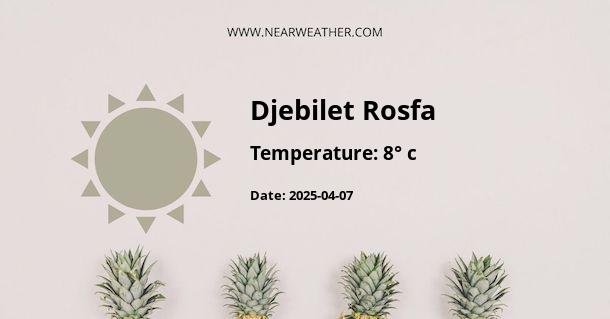Climate and Weather in Djebilet Rosfa, Algeria
Djebilet Rosfa is located in Algeria, a country known for its diverse climate and weather patterns. The climate in Djebilet Rosfa is influenced by its geographic location in North Africa, which gives rise to certain weather trends and conditions throughout the year. Understanding the climate and weather in Djebilet Rosfa is essential for residents, tourists, and businesses operating in the region. Let's explore the year-round climate and weather patterns in Djebilet Rosfa.
Annual Weather Overview
The climate in Djebilet Rosfa is classified as a hot desert climate, also known as a "hot desert" or "drought climate." This classification is characterized by long, hot summers, and mild winters with very low precipitation. The region experiences a significant temperature range between day and night, as well as between seasons. The annual weather overview provides a comprehensive understanding of the climate in Djebilet Rosfa:
| Month | Average High (°C) | Average Low (°C) | Precipitation (mm) |
|---|---|---|---|
| January | 15 | 3 | 20 |
| April | 28 | 12 | 10 |
| July | 38 | 22 | 0 |
| October | 30 | 14 | 10 |
As seen in the table above, Djebilet Rosfa experiences a wide variation in temperatures throughout the year, with summer months reaching extremely high temperatures and minimal precipitation, while the winter months are relatively milder with slightly higher chances of rainfall. The climate is also characterized by its arid conditions and minimal rainfall, which significantly impacts the region's landscape and ecosystem.
Seasonal Climate Patterns
The seasonal climate patterns in Djebilet Rosfa play a crucial role in shaping the overall weather conditions and environmental impact. The region experiences distinct seasonal variations, each contributing to the overall climate:
- Summer: The summer season in Djebilet Rosfa, spanning from June to August, is characterized by scorching heat, with average high temperatures reaching well above 35°C. The region experiences minimal to no rainfall during this period, leading to extremely dry and arid conditions.
- Autumn: Autumn, from September to November, marks a transition period with slightly milder temperatures compared to summer. The region may experience occasional light rainfall, contributing to a marginal decrease in aridity.
- Winter: Winter in Djebilet Rosfa, from December to February, brings relatively mild temperatures during the day, with average highs around 15-20°C. Nighttime temperatures can drop significantly, often nearing 0°C. There is a slight increase in precipitation during this season, supporting some plant and animal life.
- Spring: Spring, from March to May, showcases a gradual increase in temperatures and a noticeable decrease in rainfall. The landscape starts to bloom with occasional bursts of colorful flora, adapting to the arid climate of the region.
Extreme Weather Events
While Djebilet Rosfa generally experiences consistent hot desert climate conditions, the region may also encounter occasional extreme weather events that can have significant impacts on the local environment and infrastructure. These events include:
Extreme heatwaves: In the peak of summer, Djebilet Rosfa may encounter intense heatwaves, with temperatures soaring above 40°C. These extreme heat events pose challenges for residents and require proactive measures to mitigate heat-related health risks.
Flash floods: Despite the arid climate, the region may experience sudden and intense rainstorms, leading to flash floods in certain areas. These events can have destructive effects on the terrain and local communities.
Impact on Daily Life and Activities
The climate and weather in Djebilet Rosfa significantly influence daily life and activities in the region. Residents and businesses adapt to the arid conditions by incorporating specific practices and technologies to thrive in this environment. Some of the impacts include:
- Water conservation: Due to limited water resources, water conservation practices are essential for sustaining daily life and agricultural activities in Djebilet Rosfa.
- Heat mitigation strategies: Individuals and organizations implement measures to combat extreme heat, such as shading, cooling systems, and hydration practices.
- Agricultural practices: Farming and agricultural activities in Djebilet Rosfa revolve around drought-resistant crops and efficient irrigation methods to adapt to the arid climate and limited water availability.
Conclusion
In conclusion, Djebilet Rosfa experiences a hot desert climate with distinct seasonal variations, characterized by scorching summers, mild winters, and minimal precipitation. Understanding the climate and weather patterns in Djebilet Rosfa is crucial for residents, businesses, and visitors to effectively navigate and adapt to the environmental conditions. With proactive measures and adaptation strategies, the region continues to thrive amidst its unique climatic challenges.
A - Djebilet Rosfa's Latitude is 34.863750 & Longitude is 0.834960.
A - Weather in Djebilet Rosfa is 20° today.
A - Climate Conditions in Djebilet Rosfa shows overcast clouds today.
A - Humidity in Djebilet Rosfa is 44% today.
A - Wind speed in Djebilet Rosfa is 27.65 km/h, flowing at 100° wind direction. today.
